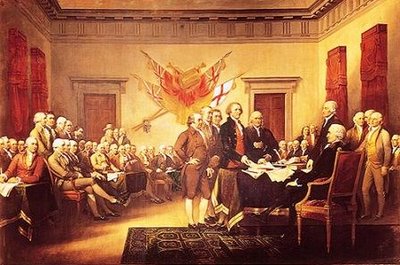
Joe Carter has an excellent write-up on a new book called "The Faiths of the Founding Fathers, by David Holmes:
What were the religious beliefs of the founding fathers? Although it might appear to be an issue of only minor historical curiosity, that question is at the heart of many of the most contentious debates in the blogosphere. Countless arguments are centered on claims that the founders were either God-fearing Christians or Deistically-inclined secularists. But while historical documents are often mined for justifying quotes, few people bother to muster historical evidence to shore up their claims.
In his new book, The Faiths of the Founding Fathers, historian David Holmes fills that void by providing a useful methodology for examining the relevant evidence. Holmes outlines four areas that can help us laymen determine whether the founding father was a Deist, an orthodox Christian, or somewhere in between:
1. Examine the actions of the founding father in the area of religion (e.g., Did they attend church regularly?).
2. Examine the participation of the founding father in a church’s ordinances or sacraments (e.g., Did they have their children baptized? Did they take Holy Communion?).
3. Comparison of inactivity versus activity in regards to religious involvement.
4. Examine the religious language used by the founding father.Using these criteria, Holmes claims that the religious beliefs of the founding fathers can be broadly classified as:
Non-Christian Deists: Deists who rejected all sacraments and rarely attended church services.
Deistic Christians/Unitarians: Held Deistic beliefs, attended church regularly, but rejected the Lord’s Supper and confirmation.
Orthodox Christians: Rejected orthodox Christian beliefs, attended church regularly, participated in the sacraments and ordinances.
Let us apply the four areas to the pre-eminent founding father, George Washington:
1. Although he was raised in the Anglican Church, Washington was never confirmed.2. Washington appears to have consistently refused to take Holy Communion, the principle means by which, as Holmes notes, “Anglicans displayed a commitment to Jesus Christ.”
3. Washington was active in the Episcopal Church, serving as both a vestryman and churchwarden. He attended services with some regularity (about once a month).
4. Washington consistently used Deistic language in reference to God. Although he often used such terms as “the Deity” and “the Supreme Being”, in his correspondence he only uses the name “Jesus Christ” once (in a letter to an Indian tribe).
A careful examination of the evidence would lead to the conclusion that Washington was, using Holmes taxonomy, a “Deistic Christian.”
Applied to other founding fathers, the list could be roughly delineated as:
Non-Christian Deists: Thomas Paine, Ethan AllenDeistic Christians/Unitarians: Ben Franklin, George Washington, John Adams, Thomas Jefferson, James Madison, James Monroe
Orthodox Christians: Patrick Henry, Samuel Adams, John Jay, Elias Boudinot, John Witherspoon
With the exception of the handful of orthodox Christians, the majority of the founding fathers subscribed to a religious view that we would nowadays classify as Unitarianism.
The leaders during the revolutionary era may have subscribed to a Judeo-Christian view of morality, but few of them were orthodox believers.
While we Christians can claim few founding fathers as fellow believers, the atheistic secularist can claim none. Not one of the significant leaders was an atheist, much less subscribed to the modern idea of secularism. Most appear to have been held to the classic “five points of Deism”:
1. There is a God.
2. He ought to be worshiped.
3. Virtue is the principle element in this worship.
4. Humans should repent of their sins.
5. There is life after death, where the evil will be punished and the good rewarded.The views of the Deistically-inclined founding fathers would have been as repugnant to the modern secularist as those of the “Christian Right.”
Very interesting! It looks like Holmes has done some great scholarly research. I'd love to cross reference his findings with some of the research Rodney Stark has done on how prevalent images of God impact social order and behavior, something we studied in my Economics of Religion class this past semester.
Just as a little tidbit of trivia, Joe's post mentioned George Washington served as a vestryman in the Episcopal Church. He did so at "The Falls Church", one of the churches I recently blogged about voting to leave the Episcopal Church.
No comments:
Post a Comment